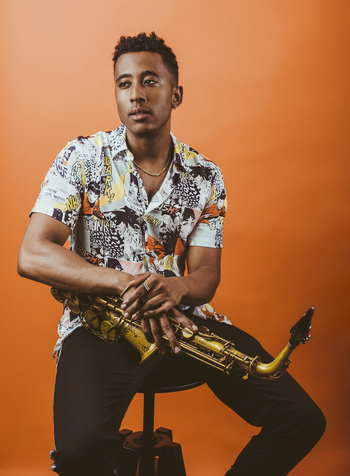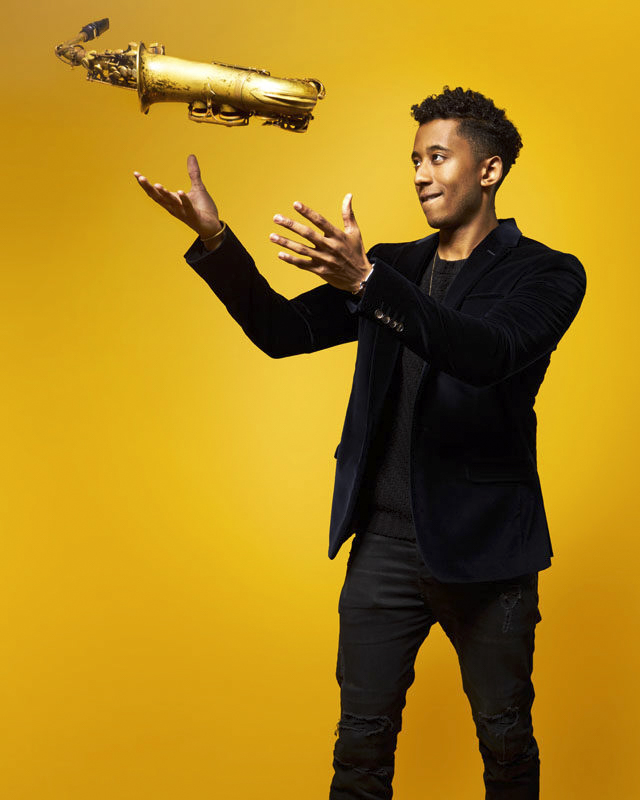
c/o songkick.com
Soulful vocals, ultra-slick lines, and rhythmic texture that’s pocketed R&B as much as it is soaring, improvised expressionism: We could be hearing the latest installment of Frank Ocean’s emotionally-rich electronic soul or an album of musical conversation that sits in the upper echelons of instrumental ability. Yet unlike any other artist I’ve listened to recently, I’m convinced we’re hearing the best of both woven seamlessly together in Braxton Cook’s newest record, No Doubt. Saxophonist and vocalist Cook takes in the best of contemporary music and outputs an intense, emotional odyssey that tastefully employs elements of R&B, trap, and modern instrumental music, with the sophisticated execution of a seasoned jazz improviser and composer.
Performer Maxwell’s Instagram story on release day tells all: simple text on a screen-shot of the album cover that reads “10 seconds in and Braxton Cook is a serious mood.” I couldn’t agree more. In fact, 10 seconds in, 4 minutes, 20 minutes, 30 minutes in; the record remains an intense mood. Think D’Angelo or Frank Ocean, if they were saxophonists. We’re not dealing with a typical “jazz album” here. It’s much more than that.
At the crux of the album’s stylistic diversity is the debate over what “jazz” is and who “jazz musicians” are. Note the quotations on the word “jazz” and imagine them heavy with years of genre-reducing context. Jazz musicians have long battled the categorization of “jazz” as an expansive musical philosophy; and now, like Hercules with a horn, Cook’s album eviscerates the “quotes” and holds hostage the uncertain designation of jazz. This categorization of the record, undoubtedly a result of Cook’s Julliard training and years of teeth-cutting with the scene’s heaviest players, is a Trojan horse for listeners, which, after the first track of certain jazz-derivative shredding, unleashes on our ears an onslaught of groovy R&B. Cook has an astute ear to the ground on No Doubt. Capturing the sounds of 2018, his intention is not just to use them, but to speak with them.
Cook’s approach to innovation traces back in part to his matriculation to Julliard, where visionary trumpet player and composer Christian Scott aTunde Adjuah picked him up for a tour. Scott’s musical philosophy, called Stretch Music (referring to an attempt to “stretch” current rhythmic and harmonic conventions of jazz), found its way into Cook’s musicality. Stretch Music lies squarely in the debate over genre nomenclature that surrounds jazz instrumentalists, ultimately a matter of whether the word “jazz” is a definition or a description. The Stretch Music manifesto offers that a definition forces the music to exist “within the confines of its explanation,” where a description engages the work in a “discourse intended to give a mental image of an experience” while highlighting relevant qualities and characteristics. Scott believes the description of his music as jazz is fine as long as it doesn’t restrict the art’s freedom to grow. It is, after all, “freedom that actually defines jazz.”
Cook specifies Stretch Music in his own blend of jazz-derived genres he calls “Future Soul Jazz,” a mix of “the improvisatory elements of jazz and the soulful melodies of R&B.” While Cook’s debut album, Something In Between, boasts some of the same cross-influence that’s so exciting about No Doubt, it’s much less refined. The first album hovers more closely to the intense virtuosity and forceful dissonance of contemporary jazz improvisation and is much more Coltrane and (explosive) Kamasi Washington than it is Frank Ocean. The sophomore album seems to nail it, balancing the instrumental dexterity required of fiery expressionism, with the weight of carefully crafted melodies over lush synthesizers and a solid backbeat.
The opening and title track, “No Doubt,” might lead us to believe we’re stepping into the texturally saturated contemporary jazz onslaught of Kamasi Washington (See Washington’s “The Epic”), and for a moment, we do sit there. Drummer Jonathan Pinson dances passionately around the beat, anchoring us down with only a snare drum and occasionally indulgent downbeats, while Cook and guitarist Andrew Renfroe play a unison melody so locked-in they sound like a single electronically affected instrument. In layers behind them are pianist Taber Gable and bassist, Henoc Montes, implying meter but primarily thickening the soup with Rhodes and an assertive bass tone. The depth of field on this tune recalls Washington’s opening track “Changing of the Guard,” a bombastic jazz approach. Renfroe’s characteristically 21st-century guitar timbre is also a nod to fast moving jazz of players like Kurt Rosenwinkel. This is nothing new for Braxton Cook—Something In Between was loaded in this type of playing. It’s a sound that permeates the super-killin Aaron Parks/Eric Harland part of the jazz world. The magic of No Doubt, however, exists where the first track ends and where the radically different next one begins.

c/o jazztimes.com
The following two songs on the album signal a stylistic transition towards songs like D’Angelo’s “Ain’t That Easy”, and the groovy R&B-half of Future Soul Jazz. They are in stark opposition to the fervor of “No Doubt” and somehow feel perfectly suited to sit side-by-side on the same album. Vocalist Lauren Desberg accompanies Cook throughout “When You Hold Me,” which breaks down as the reverb-drenched, trap-infused ballad “Like You Used To.” The album takes on an entirely new life here and a listener playing this song first would be hard-pressed to associate it with the intensity of “No Doubt” or the track that follows, “We Major.”
The album continues to alternate between hard-hitting instrumental expansions and ultra-velvety soul. (Check out “For More” to down a serious dose.) The ultimate achievement of this album is the combination of intense playing and emotional R&B perfectly woven together. It climaxes with “Lost Ones,” four minutes of elevating improvisation that hit you right in the gut after the artfully produced ballad “Wish You Well.”
I haven’t written for The Argus before now, but I feel compelled to preach the Cook gospel. Why? Because more than the masterful development of music displayed by devout improvising composers like Ben Wendel, Kneebody, Jason Moran, Nate Smith, Gerald Clayton, or Walter Smith III, young Braxton Cook hears the sounds that astute non-jazz listeners want to hear—Frank Ocean, James Blake, and D’Angelo—and pulls this off better than anyone else I’ve heard. Instrumental expressiveness doesn’t need to come from explosive playing, which is the current trademark of music that falls under the categorization of jazz. Cook certainly establishes his ability to hang in that idiom, but the sultriness of Cook’s voice, on top of tastefully complicated grooves by the rhythm section, make for a compelling set of music. It is simultaneously harmonically and rhythmically engaging while being perfectly accessible. It takes Kamasi Washington one step towards the gold standard of groove-science developed by the super-collective, The Soulquarians (see D’Angelo’s Voodoo or Erykah Badu’s Mama’s Gun). Cook is proving to have the soul and innovation that takes a fine jazz instrumentalist into the musical territory of influential innovator. No Doubt I’ll be paying attention to what he Cooks up next.
After the emotional odyssey of “No Doubt,” with our hearts gaping open, the only phrase appropriate comes straight from voices the beginning of “Outro” while Robert Glasper-esque vamp fades in from the background: “F*ck, that was awesome.”
Becket Cerny can be reached at bcerny@wesleyan.edu.